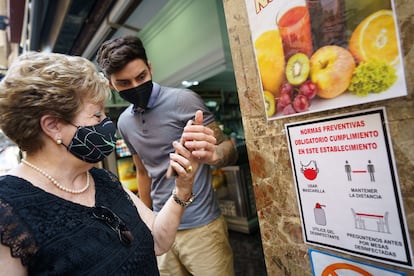Spain’s regions divided over Covid entry checks for leisure activities
In parts of Galicia, bars and restaurants require showing proof of being infection-free, but a similar move in the Canary Islands has been provisionally suspended by the courts

Demanding proof of being Covid-free to access bars, cafés and restaurants has opened up a new legal front in Spain, where some regional governments are introducing the measure amid a fifth wave of coronavirus infections, while others vehemently oppose it.
On Thursday, the High Court of the Canary Islands provisionally suspended the regional government’s recent decision to make customers show evidence of Covid vaccination, a recent negative test or recovery from the disease in order to enter dining, sports and cultural establishments. The court cited privacy issues involved in disclosing personal health information to access leisure activities.
The Canaries government had decided that in islands on a level 3 of coronavirus risk (currently Gran Canaria, Fuerteventura and La Palma), indoor capacity at bars and restaurants should be 40%, or 50% if at least 10% of customers show evidence of being infection-free. In Tenerife, which is on level 4, capacity in indoor dining spaces would be 50% with tables seating no more than four people with proof of vaccination, recovery or negative tests.
On Thursday, the regional government said it would challenge the court’s decision. Government spokesperson Julio Pérez noted that “for a year now, people have been asked for a certificate or negative test to stay in island accommodation, besides the controls at ports and airports. And many public and private centers ask for information or check people’s temperature.”
Does it affect constitutional rights? Yes, it does. But the real question is, is it acceptable? In my viewpoint, it isElviro Aranda, Carlos III University
Spain’s northwestern region of Galicia adopted a similar measure on Saturday, without running into objections from the regional court there. In Galicia, a vaccination certificate or negative coronavirus test is needed to enter indoor spaces of bars and cafeterías in 36 municipalities, including Vigo, Ourense, Pontevedra, O Grove and Sanxenxo.
Cantabria, Melilla and Andalusia are considering similar moves, the Efe news agency reported. The Andalusian deputy premier, Juan Marín, of the Ciudadanos (Citizens) party, said on Thursday that his executive might make it a “recommendation” but not an obligation.
Murcia and Catalonia are waiting for a common framework to regulate the measure, while Extremadura, the Basque Country and the Valencia region openly oppose it. Extremadura’s health chief, José María Vergeles, said he questioned whether it was legal for bar and restaurant employees to demand health information from customers, adding that a law would be required to regulate it. “The Covid passport [...] was developed for an environment of safe mobility, not for going into places,” he said, alluding to a European Union certificate known as the EU Digital Pass or EU Digital Covid Certificate that shows proof of vaccination, recovery or negative test results.
At a Wednesday meeting of central and regional health officials, Health Minister Carolina Darias said the EU pass is meant exclusively to facilitate travel between European countries. France and Italy will start demanding proof of being infection-free to enter bars and restaurants starting in August, while Germany is considering it. In Austria, showing proof of vaccination, recovery, negative tests or the EU pass is already mandatory to access everything from hotels to hair salons.
Experts divided
The legal implications of asking customers for health data have created a division of opinion, much as with other measures to fight the coronavirus pandemic such as curfews and confinements. Elviro Aranda, a professor of constitutional law at Carlos III University in Madrid, says it is a matter of balancing the interests at play. “On the one hand, freedom of commerce, of moving around, of going to a venue; on the other hand, preserving lives. Does it affect constitutional rights? Yes, it does. But the real question is, is it acceptable? In my viewpoint, it is.”
Another question is whether such measures make sense from a health point of view. José Martínez Olmos, a former secretary general of Health, feels that they are really economic measures aimed at helping out the food and drink sector, since being vaccinated “is not insurance against getting infected.”
Fernando García López, an epidemiologist at the Carlos III Health Institute, thinks that asking for the certificate to access leisure activities could be an acceptable incentive to get more people vaccinated and reduce transmission. “It would be more of a problem to demand it in school or work settings, which are essential activities,” he said.
With reporting by Silvia R. Pontevedra, Juan Navarro, Elisa Tasca, Lucía Tolosa, Javier Martín Arroyo, Mikel Ormazabal, Isabel Valdés, Lucía Bohórquez and Ferran Bono.
Tu suscripción se está usando en otro dispositivo
¿Quieres añadir otro usuario a tu suscripción?
Si continúas leyendo en este dispositivo, no se podrá leer en el otro.
FlechaTu suscripción se está usando en otro dispositivo y solo puedes acceder a EL PAÍS desde un dispositivo a la vez.
Si quieres compartir tu cuenta, cambia tu suscripción a la modalidad Premium, así podrás añadir otro usuario. Cada uno accederá con su propia cuenta de email, lo que os permitirá personalizar vuestra experiencia en EL PAÍS.
¿Tienes una suscripción de empresa? Accede aquí para contratar más cuentas.
En el caso de no saber quién está usando tu cuenta, te recomendamos cambiar tu contraseña aquí.
Si decides continuar compartiendo tu cuenta, este mensaje se mostrará en tu dispositivo y en el de la otra persona que está usando tu cuenta de forma indefinida, afectando a tu experiencia de lectura. Puedes consultar aquí los términos y condiciones de la suscripción digital.








































